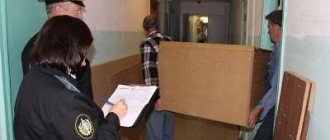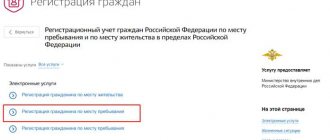What is registration?
Registration means registration carried out at the place of residence, that is, permanent. As noted, the term is not legally correct, but is widely used in practice. As an example, it is enough to give a screenshot from the State portal. It is also used, and quite officially.
A characteristic feature of registration is a direct connection with the place of residence, that is, permanent or primary residence. In contrast to temporary registration, which is carried out at a place of short stay, for example, at a hotel during a business trip or at a hotel during a tourist trip during a vacation. An important feature of the legislation is the fact that temporary registration does not cancel permanent registration, which remains.
Is it possible to live without registration?
A change of place of residence requires registration at a new place within a week. After this period, administrative responsibility begins, provided for by two articles of the Code of Administrative Offenses of the Russian Federation - 19.15.1 and 19.15.2. Possible punishment is a fine of 3-5 thousand rubles. for residents of Moscow and St. Petersburg or 2-3 thousand rubles. for citizens from other regions of Russia.
How to live without registration?
Typically, a similar situation arises when selling a home or leaving a previous place of residence/stay. If there is no new permanent place of residence, we are talking about a temporary stay in one or another residential premises. In this case, the citizen is given 90 days to register and obtain temporary registration.
The already mentioned articles of the Code of Administrative Offenses provide an exhaustive list of situations in the event of which a person is exempt from liability. For example, when living with a registered spouse or children.
What are the consequences of not registering?
As noted above, failure to comply with the established registration procedure results in a fine. Its value is 3-5 and 2-3 thousand rubles, respectively, for Moscow and St. Petersburg / other regions of the country.
The above applies to the absence of both temporary and permanent registration. It is important to remember the differences in terms of liability - 7 days for registration and 90 days for temporary registration.
The fine that is imposed on the owner or tenant of housing who fails to notify the regulatory authorities about a person living in his premises deserves special mention. In this case, the fine is 5-7 and 2-5 thousand rubles. according to a similar scheme described above.
It is important to remember that a much more serious offense is fictitious registration. Its detection results in criminal liability and provides for punishment of up to three years in prison.
What documents are needed to register in an apartment?
Registration in an apartment or private house requires the formation and submission of the following package of documents to the registration authority:
- a statement signed by the owner of the premises;
- passport (for a child under 14 years old - birth certificate);
- title documents for housing;
- consent of the owners (if the registrant is not one);
- act on the appointment of a trustee or guardian (for persons partially or completely incapacitated).
Procedure for registration in a private house: registration instructions
The first thing a tenant needs is to obtain documentary evidence of the right to move into a residential building. For owners this is an extract from the Unified State Register of Real Estate, for tenants this is a lease agreement.
Persons who are not the owners can register in the house only after approval from the owner. If the housing is owned by several owners, consent is drawn up by each of them. In this case, the co-owners must sign the document in the presence of authorized persons or issue a notarized consent.
Having collected the documents necessary for registration in a private house, the applicant is recommended to adhere to the following order:
- Contact the owner of the house, the nearest MFC or directly the OVM through the State Services portal.
- Provide a package of documents. When accepting a package of documents, responsible persons check their completeness and correctness, certify the owner’s signature, and verify passport data. If necessary, the applicant is issued a certificate of acceptance of documents.
- If the documents are accepted by the owner or the MFC, they are forwarded to the MFC within 3 days.
- Review of documents and decision making. Since the registration obligation is of a notification nature, there are no grounds for refusing registration. The applicant can be refused only at the stage of accepting documents on the basis of an insufficient set of documents or violation of the procedure for submitting them.
- Registration of a passport. An employee of the Department of Internal Affairs of the Ministry of Internal Affairs makes two notes in the document: cancels the old registration and issues a new one.
- The documents, along with the passport, are returned to the owner of the house/to the MFC.
- Handing over the passport to the applicant.
Which organizations can I register with?
Registration at the place of residence or stay is carried out in three ways. The right to choose the appropriate one is given to the applicant.
Passport Office
Traditional registration option. Provides for contacting the territorial division of the Ministry of Internal Affairs or the management company if it performs the functions of a passport office.
MFC
The second way is a personal visit to one of the multifunctional centers located in the area of residence. The procedure for submitting documents does not differ from the usual, as do the registration deadlines.
State Services Portal
The most popular registration option in today's conditions. Its advantages are obvious:
- no queues;
- efficiency;
- 24/7 access to the portal functionality.
All that is required from the user is to register on the site. The procedure does not require much time. Further actions are carried out in accordance with detailed instructions posted directly on the portal.
After processing the received application, the user receives a notification about the need to appear at a certain time at the passport office with documents. Registration takes place there without queuing or waiting.
There are several ways to find a page with the services you need. For example, by going to the following subsections of the site: main page - “Life situations” - “Purchase of housing” - “Registration at place of residence”. The information posted on the page that opens provides comprehensive information for potential recipients src=»https://f.sravni.ru/cms/uploads/2021/11/125339-2.png» class=»aligncenter» width=»1221″ height= "588"[/img]
Types of registration
There are two types of registration. Each requires separate consideration.
Constant
The first is permanent or at the place of residence, often called propiska. In this case, we are talking about your own apartment or house, purchased, built or inherited. An alternative option is housing provided under a social rental agreement.
Permanent registration requires a special stamp to be affixed to the passport. Its effect is of an indefinite nature - until forced removal from the residential premises, for example, by a court decision or voluntary deregistration.
Registration registration provides a number of additional rights:
- participate in privatization;
- register third parties in the apartment;
- influence decision-making regarding the presence of strangers in the living space;
- use some social and medical government services, for example, receiving benefits or being on a waiting list for a preschool institution.
Temporary
The second type of registration is temporary. It is carried out at the place of residence where a person intends to live for a certain time. Typically the length of stay varies from 90 days to 5 years. The fact of temporary registration is confirmed by the certificate. No marks are made in the passport.
Difference between them
The main differences between permanent and temporary registration are as follows:
- registration is mandatory for all citizens, temporary registration is issued as necessary;
- the first is of an indefinite nature, the second is clearly regulated in time ranging from 90 days to 60 months;
- permanent is terminated voluntarily or forcibly, temporary - upon expiration of the term;
- a registration stamp is placed in the passport, the fact of temporary registration is confirmed by a hand-issued certificate;
- registration increases utility bills, temporary registration does not affect the amount of housing and communal services fees;
- Permanent registration is required to obtain a full set of citizen rights, while temporary registration provides partial access to them.
Minimum standard living space per person
The minimum standard of living space per person is established by the Housing Code of the Russian Federation, regional laws, sanitary standards and is necessary to calculate the area:
- to improve living conditions;
- when providing housing to certain categories of citizens (orphans, military personnel, displaced persons from dilapidated and dilapidated housing);
- for the provision of municipal residential premises under a rental agreement in apartments and dormitories;
- to apply for subsidies for housing and social benefits to reduce utility bills.
Article 105 of the Housing Code of the Russian Federation establishes the minimum size of living space allocated to a tenant per person - 6 square meters. m. - in a dormitory or in a residential building of a flexible fund.
How to register?
The general procedure for registering and the documents required for this are listed above. Here it is necessary to note several points that are fundamentally important for the successful implementation of the event.
How to fill out the application correctly?
The application form was approved by Order of the Ministry of Internal Affairs of the Russian Federation No. 984 (dated December 31, 2017). Its careful study allows us to draw several conclusions.
What information should be present in the document?
The application for registration must include the following set of details and information:
- name of the registration authority;
- Full name of the applicant;
- previous residential address;
- information about the owner of the residential premises;
- details of the title document;
- new residential address;
- passport data and SNILS (if available) of the applicant;
- signature of the applicant and date of preparation of the document.
The second part of the document is an application for deregistration at the place of previous residence. In fact, it duplicates the information given above.
Sample application
The completed application form looks like this: First part.
Second part.
If you encounter any difficulties with its registration, it makes sense to consult with an employee of the MFC or passport office.
Possible mistakes
The most common mistake is providing inaccurate data. Therefore, before submitting an application, it is advisable to carefully check the information specified in the document. Otherwise, completing the application is not particularly difficult.
Features of registration of citizens of different ages and status
Permanent or temporary registration of different categories of citizens has some features. Let's take a closer look at the most important of them.
Children
Children under 14 years of age have the opportunity to register with their parents. If the latter live separately, then with any of them. The document confirming the child’s identity is not a passport, but a birth certificate.
Students
Registration of students living in a dormitory at the place of study is carried out by contacting an official authorized by the educational institution. Three days are given for this, the countdown of which begins from the moment you receive a room in the hostel.
Military personnel
Registration of military personnel is carried out in one of two ways:
- permanent (at place of residence) - in the general order (does not apply to those undergoing military service);
- temporary (at the place of stay) – required for a period of 90 days and requires a travel certificate or vacation ticket.
Contract and conscript military personnel, as well as members of their families, are registered at the location of their military unit. After receiving separate housing, they register in accordance with the general procedure.
Features of registration in different ways
Each of the three methods of registration in an apartment provided for by the current rules has its own characteristics:
- applying to the passport office is considered the fastest option for obtaining registration, but is accompanied by the need to stand in line waiting for a specialist;
- queues at the MFC are usually shorter, and employees of multifunctional centers are willing to help the applicant with filling out the application;
- submitting an application through the State Services website is the most convenient and fastest way, but this method still requires a personal visit to the passport office to sign the necessary documents.
It is important to understand that the total duration of registration through the MFC and State Services is slightly longer than directly applying to the passport office. Although in most cases this is more convenient and saves time on submitting documents.
Legal regulation
Changes in the procedure for registration of registration at a dacha are now regulated by 217-FZ of 2021 “On the conduct of gardening and vegetable gardening by citizens for their own needs...” This law excludes from circulation such a concept as plots for a dacha non-profit association, as well as the very concept of “dacha”. Only two types of partnerships were retained: gardening and horticultural.
This law replaced 66-FZ of 1998, which for a long time regulated issues of gardening and vegetable gardening. Although it was possible to register at a dacha before, this was associated with large bureaucratic obstacles. In Art. 3 217-FZ emphasizes that it is allowed to grow agricultural products on a garden plot of land and place residential buildings and outbuildings on it . It is the indication of the right of citizens to build residential buildings on garden plots that makes it possible to register in them. At the same time, lands for gardeners are intended exclusively for agricultural work. Owners can grow crops here, but housing construction is prohibited here. The maximum that is allowed here is small outbuildings for storing crops or gardening tools.
If citizens who have built residential buildings receive recognition of permanent buildings, then it will be possible to register here regardless of what land the property is located on.
How to register a person without his personal presence?
It is possible to formally register a person in his absence. This requires confirmation of the inability to attend for a valid reason. These include:
- disaster;
- emergency;
- serious illness;
- other force majeure circumstances.
In practice, passport office employees never implement this possibility. In other words, the personal presence of the person prescribed is not only desirable, but also necessary. The above does not apply to temporary registration at the place of stay, the registration of which is regulated less strictly by law.
Registration rules
Registration in the Russian Federation is a mandatory notification norm for all citizens of the country, as well as for persons of foreign citizenship or those who do not have citizenship but live in Russia. The rules for registration with the Ministry of Internal Affairs are regulated by approved legislative acts. These include:
- Order of the Ministry of Internal Affairs of Russia No. 984 “On approval of the Administrative Regulations of the Ministry of Internal Affairs...” dated December 31, 2021
- Law of the Russian Federation No. 5242-1 “On the right of citizens of the Russian Federation to freedom of movement...” dated June 25, 1993
- Decree of the Government of the Russian Federation No. 713 “On approval of the Registration Rules...” dated July 17, 1995
Registration of citizens is divided into:
- Permanent, which is usually called registration, gives the right to occupy living space for an unlimited period.
- Temporary, allowing you to register at your place of residence without leaving your permanent residence address.
The presented regulatory documents describe the deadlines for registration actions established both for the citizens themselves and for the responsible specialists who are directly involved in checking the provided data and entering it into the general database of the Russian Federation.
Where can I get permanent registration if I have no housing?
The relevance of the issue is due to the fact that some civil rights, medical and social services are available only to people with registration. The same applies to obtaining loans from banks or loans from microfinance organizations.
As of today, lack of housing precludes the possibility of permanent registration. The problem can be solved using one of three methods:
- purchasing housing using any of the available methods, for example, a mortgage;
- registration in the housing of relatives with their consent;
- obtaining permanent registration with the permission of the owner of the rented apartment.
The last two options require prior consent from the owners. In the case of close relatives, this looks much more realistic than when renting housing.
How to check out of the apartment?
Deregistration is required in three cases:
- moving to a new place of residence;
- purchasing an apartment or house for permanent residence;
- leaving Russia.
The procedure for leaving an apartment differs little from registration. You need to submit documents to the passport office, MFC or on the State Services portal. The application for extract serves as the second part of the one presented above for registration. Therefore, in practice, both activities are usually performed simultaneously - it is simply simpler and faster.
Two exceptions are: leaving the country and lack of clarity about the place of further residence. In such a situation, deregistration from an apartment is carried out without registration in another.
How is it determined that a dacha is suitable for permanent residence?
Many citizens have quite good country houses, but live there only in the summer due to the fact that the infrastructure is not well developed: in winter they do not clear snow, there is no access to communications and social facilities (shops and clinics), many houses do not have heating and etc. Therefore, it is not possible to register at every dacha. Registration in houses for seasonal residence is unacceptable.
A country house can be considered suitable for permanent residence if it meets a number of requirements . Among them:
- The house must have all engineering networks: connected to water supply, electricity, heating, drainage, ventilation, etc.
- The house must have reliable supporting structures and a roof.
- There should be windows in the rooms and kitchen to provide natural light.
- The heating system must be suitable for maintaining a temperature in the apartment of 18 degrees.
- The ceiling height in living rooms and kitchens cannot be less than 2.5 meters, in corridors cannot be less than 2.1 meters.
- The floor of the first floor must be higher than the planned ground level.
Deviations from the above standards are acceptable in some cases. For example, if there are no central communications in the area, then the water supply can be replaced with a well, the sewerage with a septic tank. But the height of such a house cannot exceed 2 floors.
How do you feel about the possibility of registering at your dacha?
PositiveNegativeI don’t knowI don’t have a dacha
Lawyers' recommendations
There are still many misconceptions regarding registration - permanent or temporary. Therefore, it makes sense to listen to the recommendations of competent lawyers, which include the following:
- the best option for registration is at the place of residence or registration, as it provides access to the maximum range of civil rights and government services;
- failure to register results in administrative liability and a fine;
- registration of fictitious registration is fraught with much more serious criminal liability in terms of punishment;
- legislation provides the opportunity to choose the appropriate registration method from three possible ones, so it is advisable to register as quickly as possible;
- any questions that arise are promptly resolved by contacting a specialist, most of them within the framework of an initial free consultation.
FAQ
What is the difference between permanent registration and temporary registration?
The first is issued at the place of residence, and the second - at the place of stay. The first is of an indefinite nature, the second has a clearly defined period, which is between 90 days and 5 years. The first provides access to a full range of civil rights and opportunities.
What does the term “registration” mean today?
Registration is not quite the correct term from a legal point of view, but it is often used in practice. It is almost identical to the concept of temporary registration.
What methods of registration are available to Russians?
Today, there are three possible ways to submit documents for registration - through the MFC, through the State Services portal and by personal application to the passport office. In the first two cases, a visit to the management company or department of the Ministry of Internal Affairs cannot be avoided.
What are the dangers of living in an apartment without registration?
If we are talking about violating the terms of registration, the culprit is punished with a fine. Its size is from 3 to 5 thousand rubles for Moscow and St. Petersburg or from 2 to 3 thousand rubles. for other populated areas of the country.
Terms and cost of registration registration
The total period for processing documents from the moment of submission to responsible persons cannot be longer than 6 days. The owner or the MFC must send the documents to the registration authority within 3 calendar days, the Department of Internal Affairs of the Ministry of Internal Affairs itself carries out the check and marks it also within 3 working days. If the applicant does not send documents confirming the right of residence, the registration period increases to 8 days. If documents are submitted through the MFC, the period will be 3 days and 7 days, in case of failure to provide documents on moving in, respectively.
ATTENTION!
Due to recent changes in legislation, the information in this article may be out of date!
Our lawyer will advise you free of charge - write in the form below.








